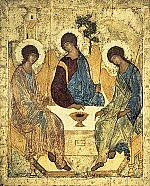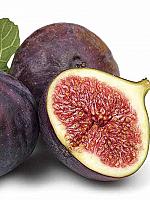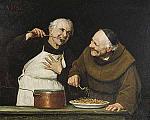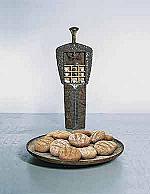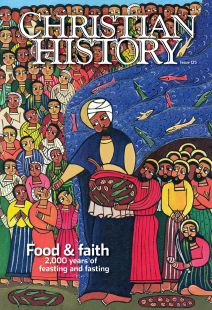Editor's note: Food
EVEN THOUGH I CAN'T COOK, this is one of the first issues of Christian History that I ever proposed—five years ago when I joined the team. My academic background is in the history of the nineteenth century, specifically the temperance movement (you’ll see some results of my research on p. 32). My years spent reading cookbooks and theological treatises at the same time, while I wrote what eventually became my first published book, convinced me that food and faith are intimately connected.
Ever since then I’ve been tucking away thoughts, author suggestions, fun facts, tidbits—and even recipes. These bits and pieces simmered like a good stew, and now the time is right to serve the finished dish. In fact I’m glad we simmered the stew for a long time, because the more we simmered, the more things we thought of to add to the pot.
From the garden to the potluck
Obviously we needed to start with the numbers of foods mentioned in the Bible and with Christianity’s holiest meal, the Lord’s Supper. But we soon collected so much more. Potlucks and fellowship meals, soup kitchens and church gardens, Christian cookbooks and Christian diets, the temperance movement, fasting and feasting, practices of hospitality . . . the list goes on.
Pretty much whenever Christians spend any time together, they eat (or in the case of fasting, don’t eat) and have something faith-filled to say about it. One of the first councils in church history, the Jerusalem Council in Acts 15, was concerned partially with whether Christians needed to follow Jewish dietary regulations.
Christians continued to weigh in on when and how to fast, what Christians should eat and not eat, how to serve food, and to whom and when. If you took food out of your own church’s weekly activities, many of those activities would look very different—or they’d simply disappear. If you’ve ever wondered why some Christians avoid alcohol or meat, or some churches host covered-dish suppers, or some monasteries make cheese, you’ll find the answers in this issue.
Because we thought of so many ingredients to garnish our stew, this issue looks a little different. We’ll begin by talking about food in the garden and travel from one “room” to the next, ending in the fellowship hall, with beautiful full-page images to guide our path. As you go along, you’ll see featured quotes from famous Christian cookbooks woven through some articles.
And last but not least, we offer four recipes from Protestant, Orthodox, and Catholic traditions. We hope you find them tasty—and indeed, we hope you like this issue’s tasty stew. As one of those cookbook authors, Robert Capon, reminds us in The Supper of the Lamb:
Why do we marry, why take friends and lovers, why give ourselves to music, painting, chemistry, or cooking? Out of simple delight in the resident goodness of creation, of course; but out of more than that, too. . . . For all its rooted loveliness, the world has no continuing city here; it is an outlandish place, a foreign home, a session in via to a better version of itself—and it is our glory to see it so and thirst until Jerusalem comes home at last. We were given appetites, not to consume the world and forget it, but to taste its goodness and hunger to make it great. CH
By Jennifer Woodruff Tait
[Christian History originally published this article in Christian History Issue #125 in 2018]
Jennifer Woodruff Tait is Managing editor, Christian HistoryNext articles
The royal way
Feasting or fasting? the constant Christian tension in the public square
Kathleen MulhernSupport us
Christian History Institute (CHI) is a non-profit Pennsylvania corporation founded in 1982. Your donations support the continuation of this ministry
Donate



